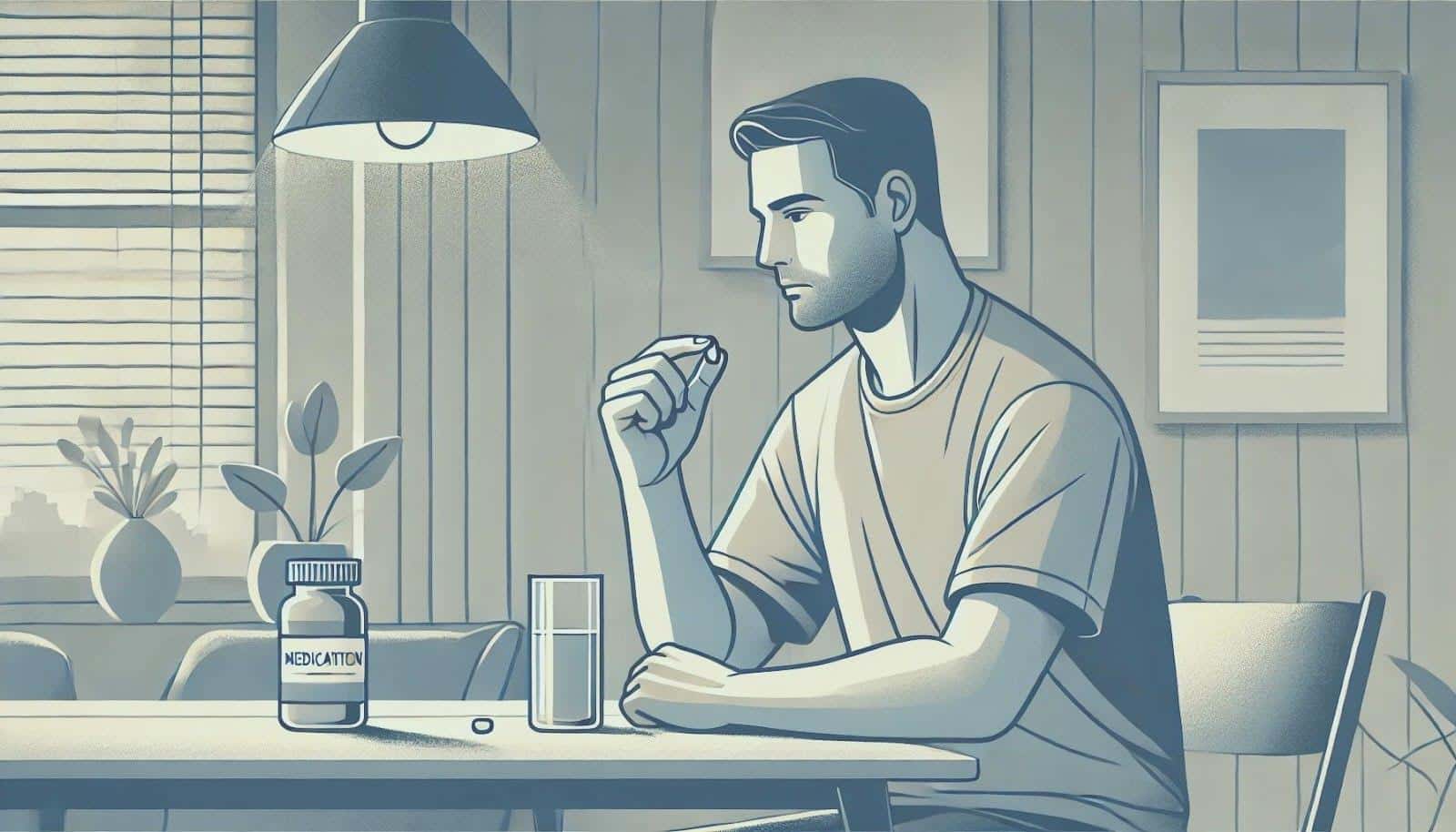Key Takeaways
- Aripiprazole is a second-generation antipsychotic commonly used to treat mania and bipolar disorder.
- Aripiprazole helps stabilize mood by targeting dopamine and serotonin receptors in the brain.
- The medication is effective in reducing manic symptoms, such as hyperactivity, impulsiveness, and mood swings.
- The typical dosage of Aripiprazole for mania ranges from 15 to 30 mg per day, depending on individual needs.
- A Mission for Michael (AMFM) integrates evidence-based treatments like those involving Aripiprazole to support individuals in managing symptoms of mania and improving overall well-being.
What is Mania?
Mania is a mental health condition characterized by an abnormally high mood, increased energy, and often erratic behavior. It often involves symptoms like excessive happiness, energy surges, or irritability—making it difficult for individuals to maintain normal functioning. Mania is part of bipolar disorder, entailing extreme mood swings. These episodes can last for days, weeks, or even longer and can significantly disrupt daily life.
Similar to schizophrenia’s relationship with schizoaffective disorder, mania often occurs within the broader context of bipolar disorder, which can also include depressive episodes. Those experiencing mania may have symptoms like rapid speech, impulsivity in high-risk activities, and grandiose beliefs. This dual nature of fluctuating between emotional highs and lows makes bipolar disorder particularly challenging to manage. 1
Causes of Mania
The exact causes of mania and bipolar disorder are not fully understood by scientists. However, research indicates that a variety of factors contribute to the development of these complex mental health issues.
Genetics are an important factor, as bipolar disorder, which includes mania, often runs in families—however, just because someone has a family member with the disorder doesn’t guarantee they’ll develop it as well. 2
Environmental factors also play a role—stressful life events, such as significant changes or trauma, exposure to substance abuse, or chronic sleep deprivation can increase the likelihood of developing mania. Additionally, research has found that people with bipolar disorder often have differences in brain structure and function. For example, some may have variations in the size of certain brain areas or in the neurotransmitter functions, which may influence how they process information and emotions. 3
Founded in 2010, A Mission For Michael (AMFM) offers specialized mental health care across California, Minnesota, and Virginia. Our accredited facilities provide residential and outpatient programs, utilizing evidence-based therapies such as CBT, DBT, and EMDR.
Our dedicated team of licensed professionals ensures every client receives the best care possible, supported by accreditation from The Joint Commission. We are committed to safety and personalized treatment plans.
Symptoms of Mania
Mania and bipolar disorder can affect individuals variably, but they predominantly impact a person’s mood, energy, and functionality. Mania is characterized by an irritable mood and increased activity or energy, significant enough to cause noticeable difficulty at work, in social activities, or with relationships. Common symptoms of mania include: 4
- Mood: Feeling extremely euphoric or overly happy.
- Increased energy and overactivity: Having an unusual amount of energy, resulting in being very active.
- Rapid speech and racing thoughts: Talking so rapidly that others cannot keep up, often with thoughts that jump quickly from one idea to another.
- Decreased need for sleep: Feeling rested after only a few hours of sleep.
- Impulsivity and poor judgment: Engaging in risky behaviors, such as spending sprees or making unwise decisions.
Types of Mania
Mania can present in various forms, each with distinct characteristics that help in understanding and treating this aspect of bipolar disorder effectively. 5
- Hypomania:Main symptoms include mood changes, increased activity, and energy. People may feel more productive and have a heightened sense of well-being but generally maintain a grip on reality. Hypomania can escalate to severe mania if not treated.
- Acute Mania: This type is characterized by extreme increases in energy and erratic behaviors that significantly disrupt daily functioning. Symptoms often include decreased need for sleep, grandiose ideas, and increased impulsivity.
- Mixed Features: Individuals experience symptoms of both mania and depression simultaneously, such as high energy levels paired with deep sadness or hopelessness, creating a complex risk for rapid mood shifts.
- Rapid Cycling: Diagnosed when an individual experiences four or more episodes of mania, hypomania, or depression within a year. This form of mania is particularly challenging to manage due to the frequency and severity of mood swings.
Aripiprazole & How It is Used for Mania
Aripiprazole, marketed as Abilify, is an atypical antipsychotic primarily employed in the treatment of mania and bipolar disorder. It functions by targeting specific receptors in the brain, notably dopamine D2 and serotonin 5-HT1A receptors, to help stabilize neurotransmitter activity and mood.
As a second-generation antipsychotic, aripiprazole is effective in reducing acute manic symptoms such as heightened mood, increased activity, and impaired judgment. It is particularly valued for its ability to manage mood without the severe side effects often associated with other antipsychotics, notably less risk of weight gain and metabolic issues, which are significant concerns with such treatments.
Aripiprazole is widely prescribed for bipolar mania and as maintenance therapy to prevent future episodes. Additionally, it is used to treat schizophrenia and as an adjunct in major depressive disorder, highlighting its broad utility in psychiatric care. 6
How Aripiprazole Works

Aripiprazole can help manage mania symptoms by balancing brain chemicals.
Aripiprazole functions by targeting specific receptors in the brain, primarily the dopamine D2 and serotonin 5-HT1A receptors. This dual mechanism allows it to modulate neurotransmitter activity, which can stabilize mood and reduce symptoms such as mania.
The medication also acts as an antagonist at the serotonin 5-HT2A receptors, which helps in balancing mood and perception. Importantly, aripiprazole is known for not significantly interacting with other receptors, such as the histamine H1 and muscarinic M1, minimizing the risk of side effects commonly associated with other antipsychotics like weight gain and sedation. 7
Aripiprazole’s Effects on Mania
Aripiprazole is highly effective in managing the core symptoms of mania associated with bipolar disorder, including both the overt symptoms (like hyperactivity and impulsiveness) and the underlying mood disturbances (such as erratic mood swings). This medication helps patients achieve a more stable emotional state, enhancing overall functioning and quality of life. 8
How Long Aripiprazole Takes to Work
The effects of aripiprazole are often noticeable within the first week of treatment, particularly for initial symptom relief such as restlessness or anxiety. For more substantial improvements, including mood stabilization and reduction in overall symptoms, it may take 4 to 6 weeks. 9
Aripiprazole Doses
This medication is typically prescribed in doses ranging from 15-30 mg per day, depending on the severity of symptoms and the patient’s response. The usual starting dose for treating mania in bipolar disorder is 15 mg per day, with adjustments made based on how the patient tolerates the medication. The maximum recommended dose is 30 mg per day. 10
Possible Side Effects of Aripiprazole
Aripiprazole is generally well-tolerated. Common side effects include nausea, dizziness, drowsiness, and changes in appetite or weight. These are typically mild and improve as the body adjusts to the medication.
Serious side effects, such as suicidal thoughts in young adults or neuroleptic malignant syndrome (marked by fever and muscle stiffness), are rare but require immediate medical attention. 11
Take the Next Step Toward Better Mental Health

Professional support is key to effective mania treatment at AMFM.
At A Mission for Michael (AMFM), we understand how overwhelming living with mania can be. The cycles of high energy, sleeplessness, and impulsive decisions followed by emotional crashes can take a toll on relationships, work, and overall well-being. That’s why we offer compassionate, expert care to help you regain control and stability.
Our approach includes personalized treatment plans designed to meet your specific needs, such as medication management, psychotherapy, lifestyle adjustments, and stress management techniques. Through a combination of evidence-based interventions and holistic care, we work to address the root causes of mania, not just its symptoms.
If you or a loved one is experiencing mania, you don’t have to face it alone. Call us at (844) 781-2706 or start the process online today—all communication is confidential. If AMFM isn’t the right fit for your needs, we’ll help you find a provider who can help. Together, we can calm the storm and build a path toward a healthier, more stable future.
Frequently Asked Questions (FAQ)
What is Aripiprazole used for?
Aripiprazole is a second-generation antipsychotic medication used to treat mania in bipolar disorder, schizophrenia, and as an adjunct for major depressive disorder.
How does Aripiprazole work in treating mania?
Aripiprazole targets dopamine D2 and serotonin 5-HT1A receptors to stabilize neurotransmitter activity, reducing manic symptoms like impulsivity and hyperactivity.
What are the common side effects of Aripiprazole?
Common side effects of Aripiprazole include nausea, dizziness, drowsiness, and appetite changes. It is generally well-tolerated compared to other antipsychotic medications.
How long does it take for Aripiprazole to show effects?
Aripiprazole may show initial effects, such as reduced anxiety or restlessness, within the first week. Significant mood stabilization typically occurs within 4-6 weeks.
Is Aripiprazole effective for long-term treatment of mania?
Yes, Aripiprazole is effective as both an acute treatment for mania and as maintenance therapy to prevent future episodes, offering long-term stability and symptom management.
Resources
- https://my.clevelandclinic.org/health/diseases/21603-mania
- https://pmc.ncbi.nlm.nih.gov/articles/PMC3181866/
- https://pmc.ncbi.nlm.nih.gov/articles/PMC7167807/
- https://www.ncbi.nlm.nih.gov/books/NBK558998/
- https://www.ncbi.nlm.nih.gov/books/NBK493168/
- https://psychopharmacologyinstitute.com/publication/aripiprazole-for-mania-2127#:~:text=Aripiprazole%20(Abilify%C2%AE)%20is%20an,%2DHT(2A)%20receptors.
- https://www.nhs.uk/medicines/aripiprazole/common-questions-about-aripiprazole/#:~:text=Aripiprazole%20works%20by%20affecting%20chemical,are%20not%20true%20(delusions).
- https://pubmed.ncbi.nlm.nih.gov/20923242/
- https://www.youngminds.org.uk/young-person/medications/aripiprazole/#:~:text=How%20long%20does%20aripiprazole%20take,works%20differently%20for%20each%20person.
- https://www.ncbi.nlm.nih.gov/books/NBK547739/
- https://www.youngminds.org.uk/young-person/medications/aripiprazole/














